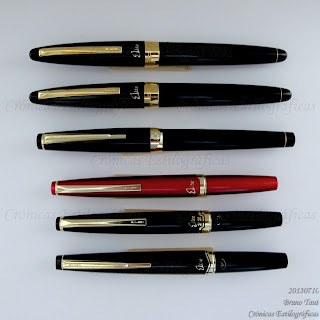But originally the Pilot Elite was a whole family of pens in a number of different styles. So many of them, actually, that it is hard to ignore the impression of Elite being a catchy word that was attached to any pen with a serious and formal look in the sixties and seventies. Or even not that formal!
It is not easy to determine the chronological order in which the following pens appeared in the market. The lot, as well, is far from being an exhaustive and complete catalog of all Elite pen Pilot released.
--The balance model. This is an easy to find pen. More often than not it is a cartridge-converter pen, but some models (1968) were equipped with an accordion sac (bellows) as the filling system Very often, but not always, their nibs were inlaid, and were imprinted with the word “CUSTOM”.
There existed balance-shaped Elite made of silver (1968) with inlaid nibs. These were the precursors of the Art Silvern series of pens still on production nowadays with some minor differences.
--The flat top Elite. Not a usual find. A cartridge-converter. Nail-type nib.
--Elite pocket pens come in many styles. All of them are cartridge-converter.
a. The all-black with golden accents and inlaid nib. Some people call this pen as “Socrates”. Nail-type nibs were also implemented and are easy to find. This pen style –black and gold— in pocket pens was popular among all pen makers in Japan, and some examples (::1::, ::2::) have been covered on these Chronicles.
b. The cross-hatched decorative pattern. Inlaid nib made gold, usually rhodiated, although some white gold units might also exist. This pen was also called “Isaac Newton”. Cheaper versions had black plastic barrel and nail-type gold nib. These are late models, made in the late 1980s.

The sought-after cross-hatched Elite, also known as "Isaac Newton". It has an 18 K inlaid nib, rhodiated.
c. Silver pens. As in the previous case, either cap and barrel or just the cap were made of silver. Inlaid and nail-type nibs were available.
d. Colorful Elite. Already by the 1969, the first Pilot pocket pen was released in the last trimester of 1968, colorful pocket Elite were marketed as S-KaraKara. Their target were students, and there was nothing formal on them. There even existed a demonstrator version of those. Their nibs were made of gold-plated steel.
As I said in the beginning, this is far from being complete. The drawback is that nobody should be surprised if more styles and shapes and colors were found.
The newly released Pilot Elite 95s costs JPY 10000, plus taxes. Second hand pocket Elite in black can easily be found, in good condition, for less than JPY 5000.
Pilot Capless FC-15SR (1989 model), stub nib by Shimizu Seisakusho – Pilot Blue
Bruno Taut
Shinjuku, July 6th, 2013
etiquetas: Pilot, mercado
Bruno Taut
Shinjuku, July 6th, 2013
etiquetas: Pilot, mercado


















6 comments:
Hi Mr Taut, I have found a cross-hatched Elite on an online shopping platform in my country, and the nib in the photos provided seem to have H677 engraved on it. This should mean that it was produced in Hiratsuka in June of 1977, right? Then wouldn't that make it a pen that was made before 1980? Thank you if you could help answer this query of mine. I have struck a deal with the seller, and will be meeting him in person to try it out.
So sorry Mr Taut, I was the anonymous person who posted the earlier comment regarding the cross hatched Elite made in 1977. I couldn't adjust the option to comment with my Google account earlier, until now. Thank you!
Aeris,
Thanks for your comment. Those dates of 1977 are perfectly compatible with the model Elite in pocket pens. In actual terms there are Eline models as early as 1968 if not earlier.
Cheers,
BT
I see, thank you so much for answering my query, Mr Taut! :)
I found a pilot elite long model in black on ebay but it has a raised textured barrel and cap. Does anyone have information on this? I can provide pictures for clarification.
Anonymous,
Nothing strange on your pen. Elite pens came both as fill size and as pocket pens. And on different external decorations. That one you mentioned is not unusual, at least in Japan.
Cheers,
BT
Post a Comment
Your comments are welcome and appreciated.